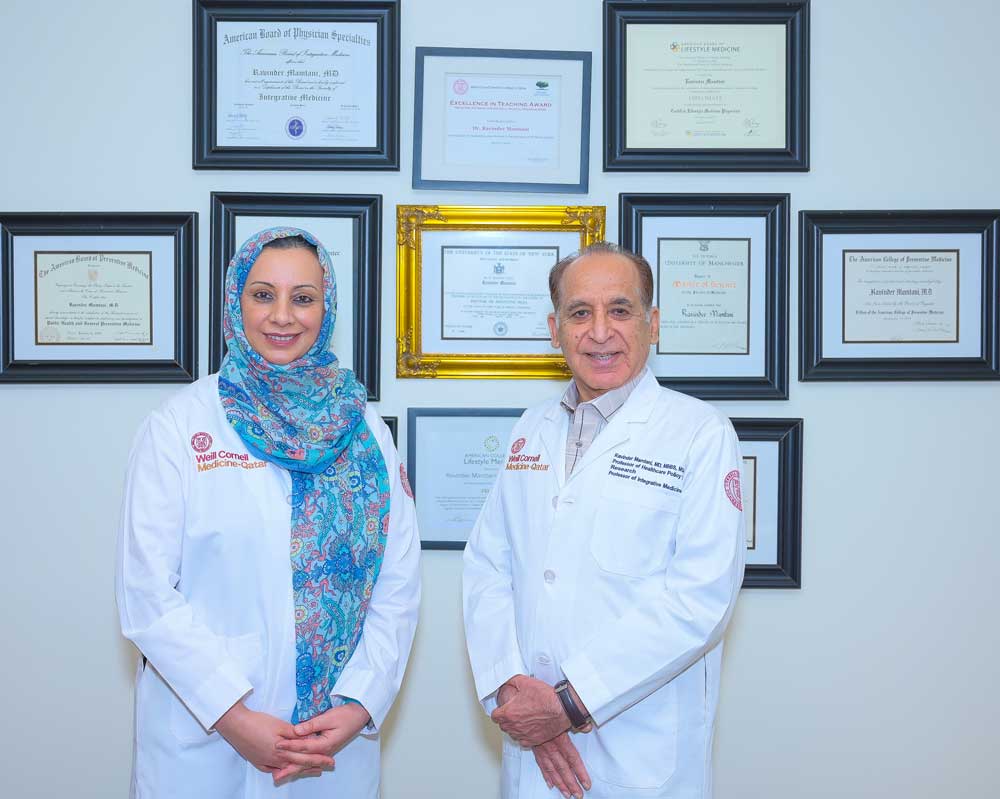Advancing Wellbeing Through Lifestyle Health

Dr. Ravinder Mamtani, MBBS, MD, MSc, Dip ABLM
- Vice Dean for Population Health and Lifestyle Medicine
- Professor of Population Health Sciences
- Professor of Medicine (Center for Global Health)
- Weill Cornell Medicine-Qatar
Dr. Ravinder Mamtani is a renowned expert in the areas of population health and public health, and a leading proponent of the emerging discipline of lifestyle medicine in the Middle East and North Africa (MENA) region. In his role with the Institute for Population Health (IPH) at Weill Cornell Medicine-Qatar (WCM-Q), Dr. Mamtani oversees a broad program of activities, including original research on population health and lifestyle medicine, provision of continuing medical education activities for healthcare professionals, education of pre-medical and medical students in population health, community health outreach initiatives, and collaborations with private and government institutions to promote health and wellness in Qatar.

Dr. Sohaila Cheema, MBBS, MPH, CPH, Dip IBLM
- Assistant Dean, Institute for Population Health
- Associate Professor of Population Health Sciences
- Weill Cornell Medicine-Qatar
Dr. Sohaila Cheema is a leading educator, researcher, program director and community leader in the fields of population health and lifestyle medicine. She is the course director of multiple continuous medical education activities at WCM-Q, is co-founder with Dr. Mamtani of the Lifestyle Medicine Interest Group-Qatar, and conducts research into non-communicable diseases, smoking and its related diseases, migrant health, road traffic injuries, integrative medicine, and the rapidly emerging field of lifestyle medicine.
Together, Dr. Cheema and Dr. Mamtani are leading advocates for lifestyle medicine in Qatar and the wider region. The IPH is supporting the Lifestyle Medicine Global Alliance to stage the Global Lifestyle Medicine Leadership Forum in Doha from February 14-17, 2024. “Hospitals” Magazine met with Dr. Mamtani and Dr. Cheema to discuss the potential for lifestyle medicine to transform health and healthcare.
Firstly, what do you understand by the term ‘lifestyle medicine’?
RM: Lifestyle medicine is a promising health approach that embraces well-established, time-honored, evidence-backed principles for promoting healthy lifestyles.
These principles encompass maintaining a balanced diet, prioritizing adequate sleep, engaging in regular physical activity, and steering clear of harmful substances like tobacco and alcohol, effectively managing stress, and nurturing positive social connections.
The body of evidence supporting the effectiveness of these strategies in preventing and addressing chronic conditions, including heart disease, hypertension, diabetes, cancer, and mental health disorders, is compelling. Moreover, research has also demonstrated the potential for lifestyle medicine to bring about the reversal of conditions like diabetes and heart disease.
Why is lifestyle medicine emerging as an important movement right now?
SC: Well, healthy lifestyle practices have always been important and many traditional approaches to health in a diverse range of world cultures are founded upon healthy lifestyle choices. But it seems apparent that lifestyle medicine as an innovative approach is becoming more popular in response to a global epidemic of lifestyle-related diseases such as obesity, type 2 diabetes, hypertension, heart disease, and some forms of cancer.
Research also shows that healthy lifestyle habits can provide some protection against neurological conditions like dementia, including Alzheimer’s disease. It is also gaining recognition because of its emphasis on prevention, its potential to dramatically enhance both lifespan and healthspan, and the way it can empower people to take positive action to protect and enhance their own health, instead of being completely reliant on doctors and other healthcare professionals.
We must stress that it is very important to note that lifestyle medicine approaches are meant to complement and augment conventional approaches and are in no way intended to replace or denigrate them.
How is the Institute for Population Health (IPH) at WCM-Q working to advance lifestyle medicine?
RM: Our mission is to enhance the health of communities at local and population levels through education, sound scientific research, and community engagement. To this end, we run many programs and initiatives that raise awareness and provide training in lifestyle medicine, we host symposia and workshops, we run certificate programs for healthcare professionals, we host community health events, visit schools and community groups, and our own researchers produce scientific studies to enhance the evidence base for lifestyle medicine approaches. One of our key programs is our 60-hour Certificate in Lifestyle Medicine, which to date has provided training to 265 healthcare professionals to enable them to effectively assess patients and prescribe tailored lifestyle medicine-based interventions. Another important initiative is our annual Lifestyle Medicine Week, which has proven extremely effective at engaging with the community to promote and provide information about healthy lifestyles.
Furthermore, we have been very proactive about reaching out to other lifestyle medicine groups around the world, both to share the benefit of our own experiences and knowledge, and to learn from their experiences.
What are the aims of the Global Lifestyle Medicine Leadership Forum?
RM and SC: We believe very strongly that lifestyle medicine is going to be critical to address the most serious challenges facing human health on a global scale in the 21st century. The aim of the forum is to bring together lifestyle medicine leaders from all over the world – we will have 28 lifestyle medicine experts from 23 different countries, each of which has a deep understanding of local, regional and global challenges to lifestyle medicine. Throughout the four-day forum, we will diligently explore existing lifestyle medicine competencies and proactively tackle any potential gaps in this area. Following that, we will generate a publishable consensus statement encapsulating our collective insights. As part of the forum, we will also dedicate a full day to continuous professional development on how lifestyle medicine is an opportunity to redefine healthcare to promote wellbeing and discuss current and progressive advances in lifestyle medicine education, practice, and research.
RM: We are extremely gratified that the IPH is able to support the Lifestyle Medicine Global Alliance—a highly reputable, effective, and influential organization—in this mission to bring the benefits of enhanced health and quality of life to communities across the Middle East and beyond.















